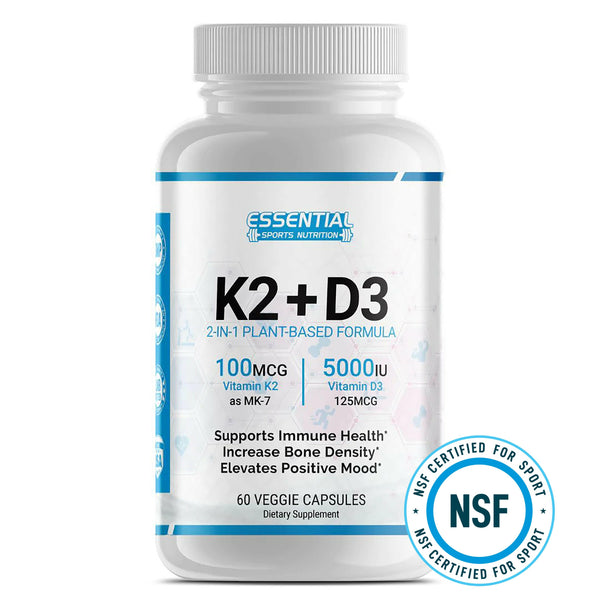Magnesium plays a critical role in over 300 enzymatic reactions in your body, including those that regulate your mood and soothe muscle tension. If you're struggling with irritability, cramps, or fatigue before your period, boosting your magnesium intake might help.
It's even more effective when paired with vitamin B6, enhancing its effects on hormonal balance. By incorporating foods rich in magnesium or considering supplements, you're taking a step towards managing those troublesome premenstrual symptoms.
Remember, though, it's essential to talk to your healthcare provider before starting any new supplement regimen.
How Magnesium Can Ease PMS Symptoms
Many women experience a significant improvement in their PMS symptoms when they take magnesium. This essential mineral helps stabilize mood swings and lessen physical discomfort, according to strong scientific evidence. Magnesium is a key ally for maintaining hormonal balance.
To benefit from these effects, include magnesium-rich foods in your diet and consider using supplements. Choosing magnesium to support menstrual well-being is a smart move that is scientifically validated.
Understanding Magnesium's Role

In addressing your PMS symptoms, you'll find that magnesium plays a crucial role by regulating neurotransmitters, which directly influence your mood and pain levels. The effect of magnesium on the body is multifaceted, particularly during the menstrual cycle. Magnesium supplementation has emerged as an evidence-based treatment for premenstrual syndrome, effectively reducing the severity of premenstrual symptoms.
The therapeutic potential of magnesium lies in its ability to calm the nervous system and normalize hormonal actions. A magnesium deficiency can exacerbate PMS symptoms, leading to heightened stress responses and an imbalance in pain perception. By restoring adequate magnesium levels, you may experience a significant attenuation of both the emotional and physical manifestations of PMS.
Scientific analysis supports the use of magnesium in the treatment of premenstrual syndrome, attributing its benefits to the mineral's role in neuromuscular function and neurotransmitter regulation. With regular magnesium supplementation, studies indicate a consistent decrease in the severity of PMS symptoms, underscoring its importance in maintaining menstrual health.
Therefore, ensuring optimal intake of magnesium may not only alleviate current discomfort but also serve as a preventive approach to managing PMS.
Magnesium's Impact on Mood

Feeling better during PMS is possible when you add magnesium to your routine. This mineral, often abbreviated as Mg, is key in soothing your nervous system. That's a big plus for anyone dealing with mood swings that come with premenstrual syndrome (PMS).
Magnesium helps by calming down activity in the brain that deals with stress, leading to less anxiety and lowering levels of cortisol, which is known as the stress hormone.
If you're thinking about taking magnesium supplements, they're known to help with PMS symptoms, especially when you take them with vitamin B6. Together, they work even better to keep your mood steady and can also help keep premenstrual migraines at bay. Since migraines are a frequent issue for people with PMS, this is great news.
Plus, magnesium's ability to ease anxiety is beneficial for your menstrual cycle health and overall happiness.
When you tackle the ups and downs of emotions that often come with PMS, you're on track to a better everyday life. Magnesium's power in improving mood is impressive, and it helps with physical PMS symptoms too, which we'll cover next.
Alleviating Physical Symptoms

Magnesium not only improves your mood, but it also helps ease the physical discomfort of premenstrual syndrome (PMS) by relaxing the muscles in your uterus. This can lead to less cramping. For lots of people who get periods, cramping is a big problem that can disrupt daily life. Studies show that magnesium is key in making these cramps less intense. It works by lowering the amount of prostaglandins, which are chemicals in your body that can cause pain and swelling. By taking magnesium, you might be able to get some relief from painful periods.
Combining Magnesium with Vitamin B6 for Enhanced Benefits
Researchers have noticed that when you take magnesium with vitamin B6, it can work even better to relieve PMS. Together, they seem to do a great job of easing muscle tension and might even help make your menstrual cycle better overall.
Why Magnesium Matters for Menstrual Health: Benefits of Magnesium
The research about magnesium and how it helps with PMS shows that it's a good option for people who want to try something natural and don't want to use medicines. If you often have bad cramps during your period, getting the right amount of magnesium could help you feel better every month. This can make a big difference in your life and help you feel better overall.
Dietary Sources of Magnesium

Eating foods high in magnesium, such as pumpkin seeds and almonds, can help you naturally tackle PMS symptoms. It's essential to know that many people don't get enough magnesium from their meals. For women, hitting the daily magnesium target of 320 mg is key to easing PMS discomfort.
Magnesium-Packed Foods for Your Diet:
-
Pumpkin Seeds: Grab a handful for a quick magnesium boost.
-
Almonds: Munch on these nuts for their magnesium and satisfying texture.
-
Black Beans: Add these to your dishes for both their magnesium and other health perks.
-
Edamame: These make a delicious and magnesium-filled snack.
Choosing the Right Magnesium Supplement:
If you're thinking about taking a magnesium supplement, consider magnesium glycinate. It's known for being easy to absorb and gentle on your stomach. Studies show a magnesium-rich diet can help with PMS symptoms, which highlights why it's important to focus on these food sources.
Optimal Magnesium Intake Strategies

To optimize your magnesium intake for PMS relief, you should focus on both dietary sources and supplementation. Consuming magnesium-rich foods like leafy greens and nuts provides a natural synergy of nutrients. However, studies suggest that adding a daily supplement of 200-250 mg can more reliably meet your needs.
Timing your supplementation about meals and pairing it with vitamin B6 may further enhance absorption and symptom management.
Dietary Sources
Eating foods with plenty of magnesium can help you handle PMS symptoms better. Research shows that getting enough magnesium, which is essential for your health, can be good for women with premenstrual syndrome.
Here's how you can get more magnesium from what you eat:
-
Toss pumpkin seeds into your salads for a tasty crunch that can also ease PMS discomfort.
-
Mix chia seeds into your breakfast oatmeal to help keep your mood steady.
-
Enjoy almonds or almond butter on fruit for a calming dose of magnesium.
-
Add black beans to your dishes as a solid way to support your fight against PMS.
Some might find taking a magnesium glycinate supplement, which is magnesium attached to a gentle acid, or a combo of magnesium and vitamin B6, helps with PMS too.
Supplementation Dosage Timing
To get the most from your magnesium supplement, it's best to take it with your breakfast and again with your dinner. Splitting the dosage promotes consistent magnesium levels in your body, which may help ease PMS symptoms before your period starts.
| When to Take | What to Take |
|---|---|
| Morning | Magnesium glycinate with vitamin B6 |
| Night | Magnesium and vitamin B6 combo |
A morning dose of magnesium glycinate offers a smooth release of the mineral, minimizing stomach discomfort. At night, combining magnesium with vitamin B6 can boost the mineral's ability to relieve PMS. Always follow the suggested dosage, and if you need to make changes, talk with a doctor or a qualified health expert.
Why Splitting Your Magnesium Dosage Makes Sense
When you split your magnesium intake, you help your body absorb and use the mineral efficiently. This can be particularly helpful for women dealing with PMS. Here's the breakdown:
Morning Dose: Magnesium glycinate is a gentle form that is released slowly into your system. It's easy on the stomach and an excellent way to start the day.
Evening Dose: Before you head to bed, a magnesium supplement with added vitamin B6 can further support your body's management of PMS symptoms.
Magnesium and Hormonal Balance

Keeping the right amount of magnesium in your body can help keep your hormones in check and ease PMS symptoms. Magnesium is super important for lots of things your body does, including how it controls hormones that affect your period. Taking magnesium with vitamin B6 might make PMS symptoms less of a hassle, especially if you take it all through your cycle.
Magnesium glycinate is a type of magnesium that your body can use well, and it's great for PMS. It helps keep your hormones balanced, which can make you feel better emotionally and physically before your period starts. Here are some ways magnesium can help:
-
Calm Your Nerves: Magnesium can help relax your mind, which might make you feel less anxious and moody when you have PMS.
-
Ease Cramps: It can help with menstrual cramps by making your uterine muscles chill out and reducing certain chemicals that cause pain.
-
Headache Prevention: Taking magnesium regularly can help keep pre-period headaches away.
-
Keep Blood Sugar in Check: Magnesium helps your body use insulin better, which keeps your blood sugar levels steady, cutting down on cravings and mood swings.
Studies show that magnesium is really useful for dealing with PMS. By helping to keep your hormones balanced, magnesium can make you feel better every day, not just during your period.
Magnesium and PMS FAQs:
Q: What is premenstrual syndrome (PMS) and how does it affect women?
A: Premenstrual syndrome (PMS) refers to a combination of physical and emotional symptoms that many women experience in the days leading up to their menstrual period. Symptoms can include bloating, mood swings, irritability, and physical discomfort.
Q: How can magnesium help relieve symptoms of PMS?
A: Magnesium may play a crucial role in reducing the symptoms of PMS, as it is known to help reduce bloating, ease period pain, and improve mood changes associated with the menstrual cycle.
Q: What are the benefits of using magnesium for menstrual cramps?
A: Magnesium can help relieve menstrual cramps by relaxing the muscles and reducing the intensity of the cramps, providing a natural and effective way to manage period pain.
Q: What are some magnesium-rich foods that can help increase your magnesium levels?
A: Foods high in magnesium include leafy green vegetables, nuts and seeds, whole grains, and legumes. Incorporating these into your diet can help increase your magnesium levels.
Q: Can magnesium help with symptoms like menstrual migraines?
A: Yes, magnesium may help alleviate menstrual migraines by regulating serotonin levels and reducing the frequency and severity of migraines associated with the menstrual cycle.
Q: Is magnesium supplementation recommended for those suffering from PMS?
A: If you have low levels of magnesium or experience severe PMS symptoms, your healthcare provider may recommend magnesium supplementation to help alleviate symptoms and improve overall well-being.
Q: What type of magnesium supplement is most effective for relieving PMS symptoms?
A: Magnesium citrate or magnesium oxide are commonly used supplements for relieving PMS symptoms, as they are well-absorbed by the body and can contribute to magnesium levels.
Q: Can magnesium help reduce premenstrual mood changes and irritability?
A: Yes, magnesium plays an important role in regulating mood and can help reduce premenstrual mood changes and irritability, promoting a more balanced emotional state during the menstrual cycle.
Q: Are there any potential risks or considerations when using magnesium for PMS relief?
A: It's important to consult with a healthcare professional before beginning magnesium supplementation, especially if you have kidney disease or are taking other medications, to ensure it is safe and appropriate for your individual health needs.
Q: How can increasing magnesium levels benefit perimenopausal symptoms?
A: Increasing magnesium levels may help reduce symptoms associated with perimenopause, such as mood swings, irregular periods, and menstrual cramps, providing natural support for the transitional phase of menopause.
Frequently Asked Questions:
What Type of Magnesium Is Best for Reducing PMS?
Magnesium glycinate is often recommended for those dealing with PMS. It's known to be well absorbed by the body, which can help in maintaining hormonal balance. Plus, it's gentle on the stomach, so you're less likely to experience any digestive issues. This form of magnesium can be a big help in easing the discomfort that comes with PMS.
Is It Good to Take Magnesium Before Your Period?
Yes, taking magnesium before your period can help alleviate PMS symptoms, as it relaxes uterine muscles and reduces pain-inducing prostaglandins, improving your overall comfort during this often uncomfortable time.
Which Magnesium Is Best for Hormonal Balance?
To keep your hormones in check, you might want to look at magnesium. Specifically, magnesium citrate, glycinate, and malate are good choices. They have benefits that help with different hormone-related issues. For example, if you need a calm mind and regular bowel movements, these forms of magnesium can assist with both.
Magnesium citrate is known to help with constipation, which can indirectly support hormonal health. Magnesium glycinate is often recommended for its calming effects, which may reduce stress and promote better sleep—both crucial for hormonal equilibrium. Lastly, magnesium malate is praised for its ability to support energy production, which is vital for overall health, including the endocrine system.
How Much Magnesium Should You Take for PMDD?
"An ounce of prevention is worth a pound of cure," so for PMDD, you should consider starting with 200-250 mg of magnesium daily, adjusting as necessary based on symptom relief and tolerance.
Magnesium's Role in Alleviating PMS Symptoms
Research shows that about 80% of women find their symptoms get better with magnesium. This mineral plays a big role in keeping moods stable and reducing physical pain, which is backed by solid research. Magnesium is a natural source of support for your hormonal health.
To make the most of these advantages, eat foods rich in magnesium and think about adding supplements to your routine. Using magnesium for menstrual health is a wise choice supported by evidence.























